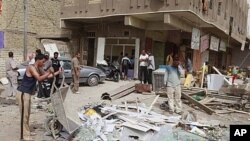A series of explosions rocked the Iraqi capital Baghdad and other parts of the country Thursday, killing at least 35 people and wounding more than 100 others. The violence comes as Sunni opposition groups and the Kurds continue to battle with Shi'ite Prime Minister Nouri al-Maliki, accusing him of increasingly authoritarian rule.
Ambulances ferried the wounded to hospitals in the northern Iraqi city of Kirkuk Thursday, following an explosion there and over a dozen others, elsewhere across the country. It was the worst violence in nearly a month, since a series of blasts just prior to the Arab League Summit in Baghdad.
A young man in Kirkuk describes how he had just left his home during morning rush hour, when he was startled by the sound of an explosion.
He said he had just stepped out the door at around a quarter to eight in the morning and got into his car, when another car passed him, before a policeman came by and the other car exploded.
Colonel Dhiya al-Wakeel, a spokesman for the Baghdad operations command, told the state-owned TV that the attacks were an attempt to convince the Iraqi people that the country was insecure after a U.S. troop pullout late last year.
No group has yet claimed responsibility for Thursday's attacks.
Middle East analyst James Denselow of King's College London says that Iraq remains politically unstable, leaving the door open to a rash of politically motivated violence:
“Iraq today is recovering from a civil war but still has a very weak political system [and] finds it impossible to process difficult decisions and therefore violence on the street is a by-product of that inability," he said. "So, you have the political elites feuding and you have bombs and assassinations as another means of conducting politics in the country.”
Heightened tension between Shi'ites, Sunnis and Kurds in the coalition government since U.S. troops withdrew in December has raised fears of a return to sectarian strife. Bombings and killings happen daily in Iraq, often aimed at Shi'ite areas and local security forces.
| Join the conversation on our social journalism site - Middle East Voices. Follow our Middle East reports on Twitter and discuss them on our Facebook page. |




